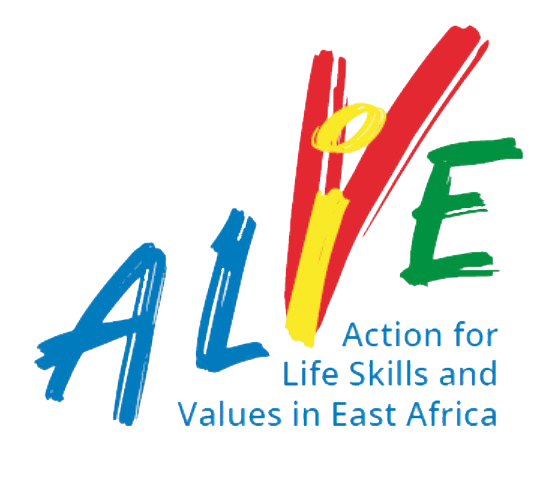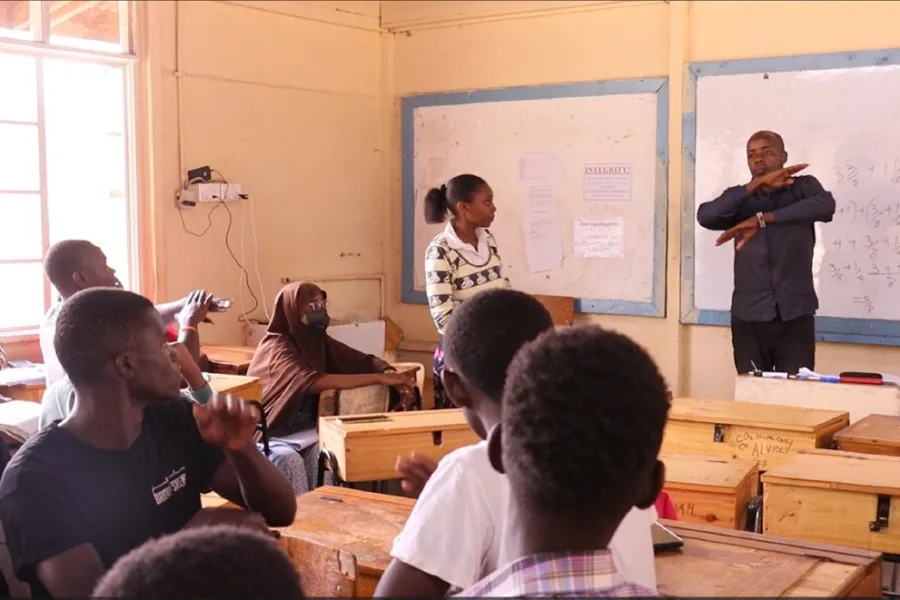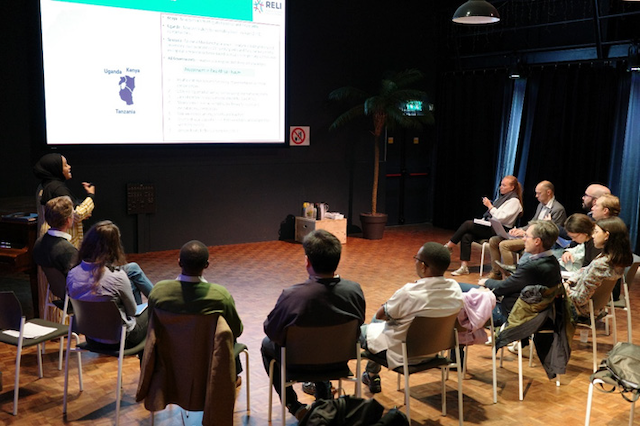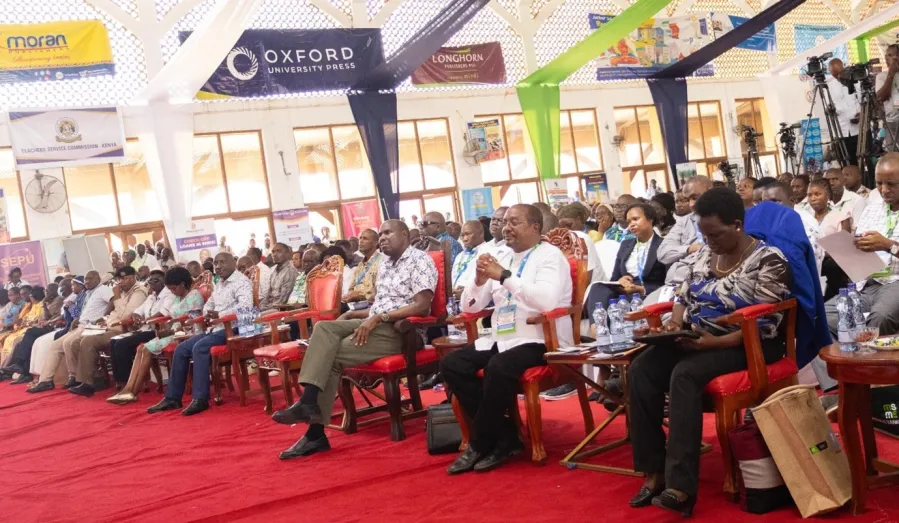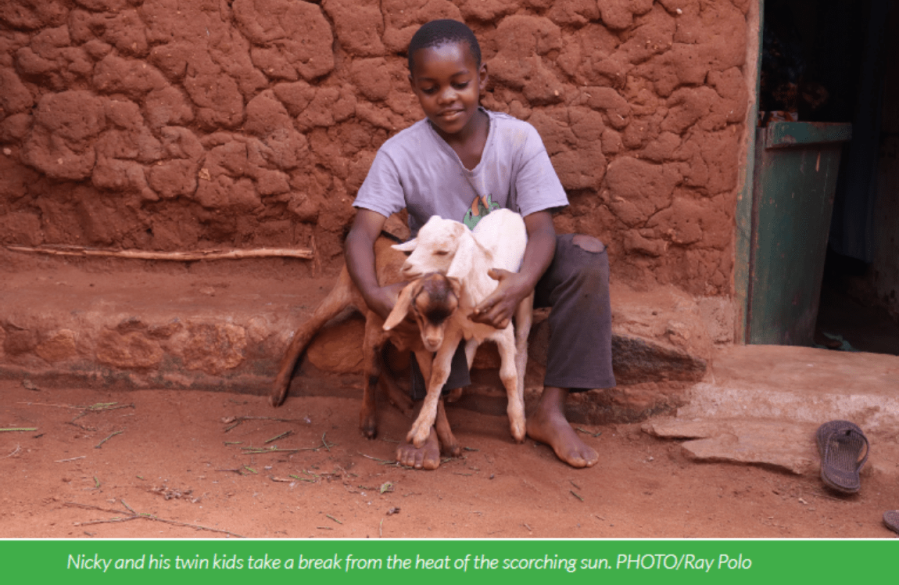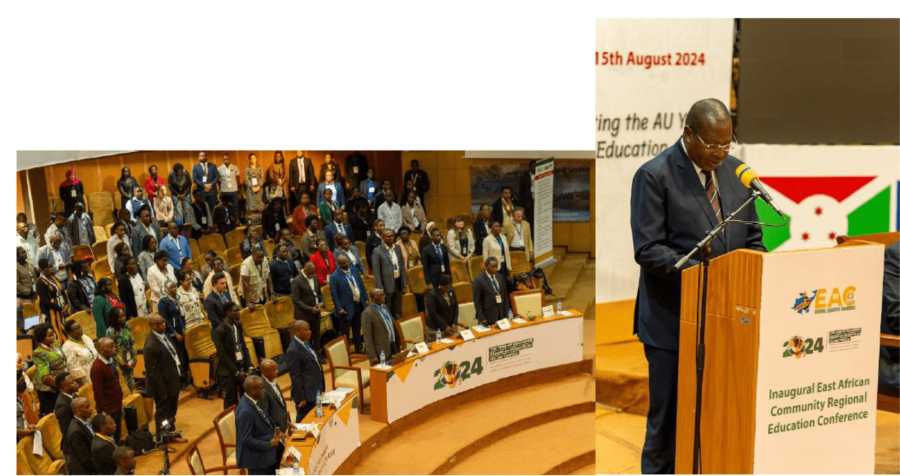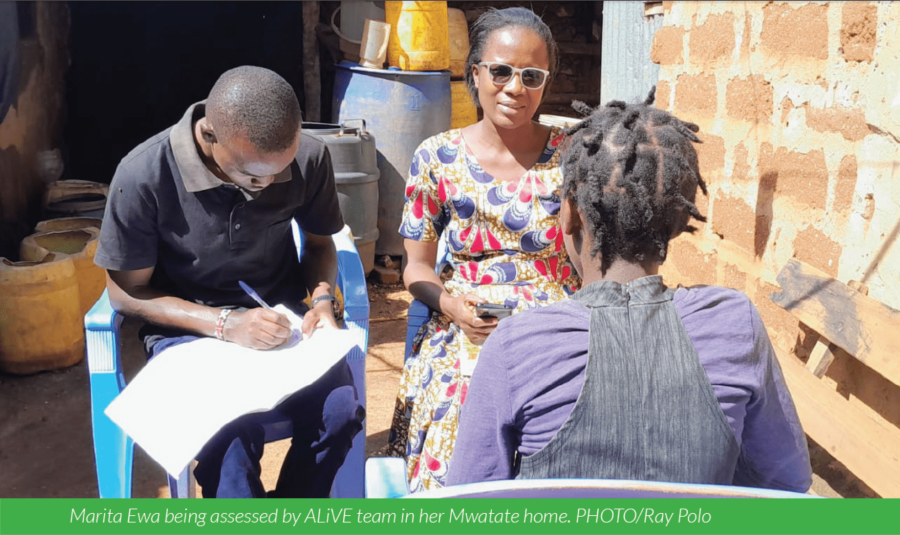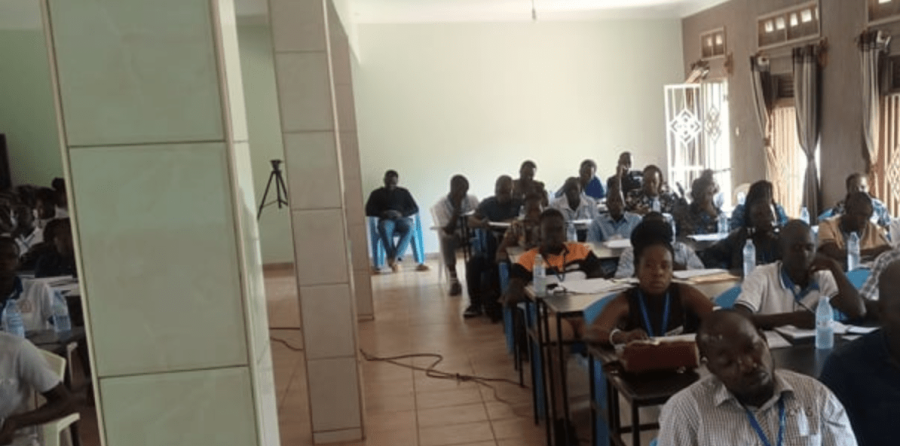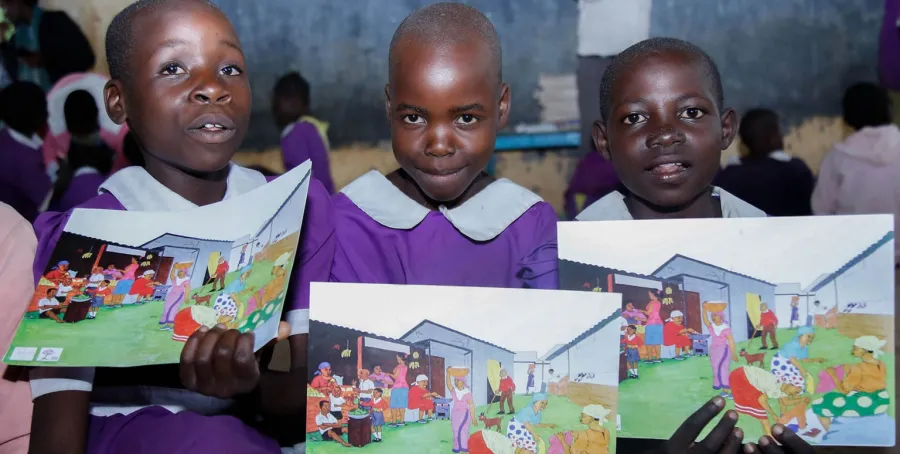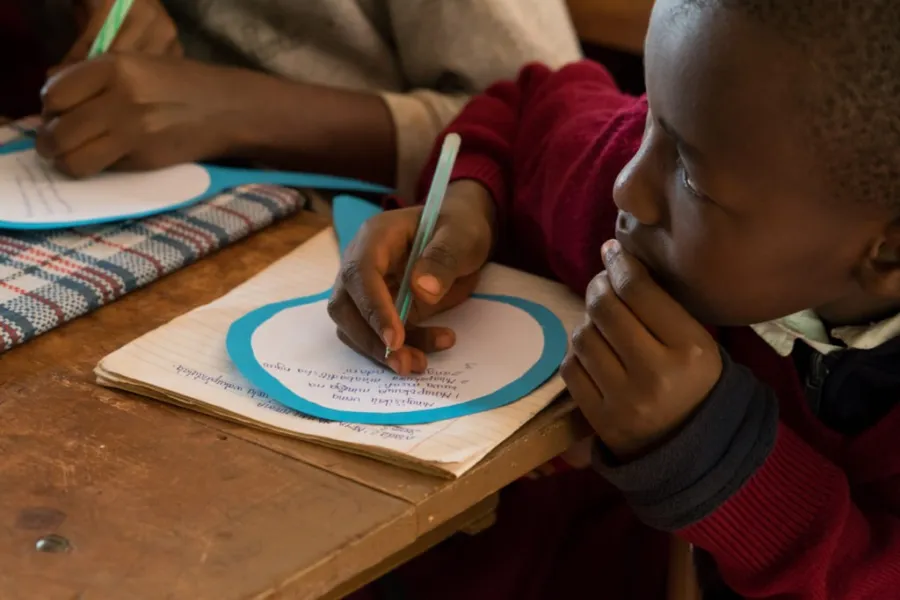At Machakos Teachers Training College, learners from all walks of life are admitted regardless of their physical abilities. The College has embraced Kenyan Sign Language (KSL) in classrooms and other social spaces. In a learning environment where spoken language predominates, the incorporation of sign language interpretation in classrooms is boldly breaking communication barriers between learners and their educators, thus fostering a more equitable and inclusive learning experience. Students who are hearing impaired communicate with their hearing peers through signs. Even in their blended group discussions, they embody a rare sense of acceptance and collaboration. Inclusion has been a sad song that has not tickled many learners with disability, despite the progress made through decades of learning. However, the introduction of Kenyan Sign Language at basic education levels in Kenya may help change the tune. A danceable move may follow efforts made by both state and non-state actors to support learners and workers to learn and use Kenyan Sign Language. It is a welcome move at Machakos TTC where hearing students and staff learn KSL every so often and tap on signs from the hearing-impaired students as well. It is worthy recognition of who can learn which language to bridge the silent gap of communication that is often evident between hearing and deaf populations. Access to education in Kenya has historically been limited and the journey towards inclusivity has been rugged. Among the various strategies to foster an inclusive learning environment, sign language stands out as a powerful tool, particularly for students with hearing impairment. Through the Kenyan Sign Language, the students are not only able to communicate, but it also builds confidence among deaf students. It is the secret code to experiencing their otherwise silent world. A peek into the second-year Mathematics class at Machakos TTC gave us a new lens through which to look at inclusion. In every corner of the class and at the centre, students were communicating in signs to help sign outspoken statements from their peers. When it came to demonstrating their understanding of the mixed fraction lesson, time and chance happened to all. First, it was Rose Nafula’s turn to show how best she would take a learner through a mixed fraction sum. She speaks and engages the rest of the class as Alice Wambui the assigned KSL interpreter signs along. When Nafula is done, Beston Kiprotich takes the stage. He is a signer. He takes on the sum while Wambui helps to voice his signs to the rest of the class. What a sight to behold! A world of signs and sounds toward a common answer. The integration of Kenyan sign language and interpreters into Kenyan classrooms is a laudable step towards a more inclusive educational system. In a classroom where communication is accessible to all, students no longer feel isolated due to their hearing impairment. They can actively participate in discussions, contribute their ideas, and equally engage in class activities. In turn, this makes the classroom environment more equitable for everyone. Moreover, the act of learning sign language and interacting with interpreters promotes broader societal inclusion. It challenges the assumption that spoken language is the only way to communicate and encourages a culture of inclusivity. Machakos TTC is one of the institutions that collaborate with Zizi Afrique Foundation (ZAF) to champion core competencies, also known as life skills and values. Other than supporting teacher educators at the college to define, integrate, nurture and assess the core competencies, Zizi Afrique Foundation has influenced the formation and strengthening of clubs to enhance the implementation of competency-based education. One such club is the Peace Club, where students have a platform to freely express themselves while respecting each other’s opinions and diverse backgrounds. Other efforts include talking walls, boards and seats, that constantly remind the school community about the desired values and life skills. The college has gone further to introduce the said values and life skills during students’ orientation. They practice the same as they go about their businesses within and without the college. If there was any challenge I got from our trip to Machakos Teachers Training College, it is the challenge to learn and communicate in Kenyan Sign Language! Erika Mungai Article by Erika Mungai
Amidst ongoing global concerns regarding the direction and implementation of education, East Africa is experiencing an educational transformation, with curriculum reforms at the forefront of this shift. The shift to competency-based education (CBE) has sparked a growing emphasis on nurturing life skills and values to educate learners fit for the 21st century. However, a lasting impact may become elusive if educators lack the skills to effectively teach, assess, and foster these competencies throughout the school system. The transition requires teachers to adapt to CBE with new teaching strategies and a deeper understanding of how to foster competencies such as critical thinking, creativity, and problem-solving, among others, in their learners. The technical capacities to teach, assess, and nurture these competencies remain a real challenge in many classrooms, leading to disparities in how the competency-based curriculum (CBC) is delivered across schools. The risk is that the CBC could exacerbate existing inequalities instead of bridging gaps. With limited evidence on what works in nurturing life skills and values, there is no better time than now for researchers and academics, to collaborate in exploring promising approaches to nurturing life skills and values through rigorous and robust studies. The potential impact of this research is significant, as it will generate the evidence necessary to inform and support the implementation of CBC. Evidence on the specific needs of teachers, students, and school systems is essential for targeted school interventions, tailored professional development for teachers, and curated learning materials that ensure all schools, regardless of location, can deliver the CBC effectively. The Action for Life Skills and Values in East Africa (ALiVE) initiative, in partnership with Kenyatta University (Kenya) and the University of Utrecht (Netherlands), has since May 2024 been exploring collaborative research opportunities that seek to bring together leading universities in the East Africa region with universities in the global north for a North-South research agenda, aimed at delivering what works in nurturing life skills and values. Regional organizations have since joined the collaborative. They include United Nations Children’s Fund (UNICEF), Aflatoun International, Network of Impact Evaluation Research Africa (NIERA), and Education Sub-Saharan Africa (ESSA), alongside regional higher institutions of learning like Strathmore University and the University of Dar-es-Salaam. Others like Kyambogo University, Makerere University, and State University of Zanzibar have also shown interest. The first co-creation meeting organized and hosted by Kenyatta University occurred on September 23rd – 24th 2024. Different government entities, including curriculum institutes, teacher service commissions, assessment agencies, and teacher educators, participated in the workshop to co-create a research agenda, focusing on exploring promising nurturing approaches that teachers (and parents, to some extent) use to develop values and life skills. During the workshop, participants co-developed a strategy for a randomized controlled trial (RCT) to identify the most effective methods for nurturing life skills and values. The participation of key government stakeholders, including representatives from the Kenya Institute of Curriculum Development (KICD) and the Teachers Service Commission (TSC), contributed valuable insights to ensure practical application and policy alignment. A central theme of the workshop was the need to strengthen locally led research, remarkably increasing the involvement of women and early-career African researchers. By fostering collaboration and promoting African-driven solutions, the workshop laid a foundation for meaningful improvements in teacher education and the overall implementation of CBC in classrooms across East Africa. Find out more about our work on www.alive-reli.org
More than 15,000 delegates are gathered in Mombasa for the annual Kenya Primary School Headteachers Association (KEPSHA) conference 2024. This year’s theme is “Transformative Leadership in the Digital Transition, for Inclusive and Sustainable Quality Basic Education in Kenya.” The conference, which also doubles as the KEPSHA Annual General Meeting, was officially opened on Tuesday by the Chief of Staff and Head of Public Service in Kenya, Mr. Felix Koskei. Mr. Koskei underscored the value of digital technology in improving learning and advancing school leadership and management while also emphasizing the need for collective responsibility in ensuring that the digital transition does not erode learners’ values. Global digital transformation has redefined how we learn, how we teach and how we lead. We urge all teachers to make digital literacy an integral part of every learner’s journey, equipping them with the skills to become suitable digital citizens and innovators of the future. Mr. Felix Koskei, Chief of Staff and Head of Public Service in Kenya The Principal Secretary for Basic Education Dr. Belio Kipsang appreciated teachers for stabilizing the implementation of competency-based curriculum (CBC). He also lauded the milestones in integrating digital technology into the Kenyan Education system. Technology is the way to go because it supports both delivery and assessment of our curriculum. The assessments in teacher training colleges will all go digital both in administration and marking. We look forward to leveraging technology in similar ways in our schools too. I thank you teachers for taking charge of the 2024 Kenya Primary School Education Assessment (KPSEA), which concluded without challenges. I am happy that we did not need police officers to man assessment centers with guns as had been the case before. This is a huge relief because assessment should be done in a cheerful and relaxed atmosphere. Dr. Belio Kipsang, Principal Secretary for Basic Education The leaders reiterated the need for deliberate integration of values and life skills in education, to help develop a whole learner who will be ready for opportunities and challenges of the 21st Century. Primary school education is not merely a phase, it is a critical level where we embed essential values, cultivate skills and instill competencies upon which students rely for their journeys in life. We appreciate that education is a sum of intelligence and character. Allow me to share wisdom from an old man who taught me never to hire for competencies alone but to always hire for character. This is because, you can train people to acquire skills, but you cannot teach them to become who they are not – in character. Mr. Felix Koskei, Chief of Staff and Head of Public Service in Kenya On his side, the KEPSHA National Chairman Mr. Johnson Nzioka urged headteachers to embrace technology as a vehicle to effectively navigate the complexities of modern leadership. He called on the government to employ more teachers who would share in the growing workload of the progressing competency-based curriculum. Mr. Nzioka spoke as he presided over KEPSHA rebranding. We are not just gathered to celebrate our achievements but also to launch a new chapter in our story, a chapter defined by a revitalized identity, renewed commitment and a bold vision for the future of primary and junior school leadership in Kenya. We can only look into the future with purpose, passion and professionalism. A future where every child in Kenya can access quality education and where every school headteacher is empowered to lead with excellence. Mr. Johnson Nzioka, KEPSHA National Chairman Click here to watch the opening ceremony Technology for School Leadership: Phone, Data, Evidence and Decisions The Executive Director of Zizi Afrique Foundation, Dr. John Mugo noted the organization’s digital journey and the power of technology as a tool for transformative change. His presentation shared existing innovations that have worked to ease the implementation of CBC, both within and without Zizi Afrique Foundation. “We have adopted a lot of technology at Zizi Afrique Foundation. Our digital dashboards, for example, allow us instant access to information on our programs just at the click of a button. When I want to track our progress, I don’t need to do many emails and give colleagues time to respond. I just click it and get it right where I am.” Dr. Mugo praised the power of technology in expanding access to educational information and interaction across communities. Today, we no longer think of education and child labour as ‘either/or’. Through technology, the young people herding animals in Mandera, and the married girls in Samburu, can have education without abandoning their culture. We must make learning possible for them. We must use technology to enhance the learning experience. Previously, teachers spent a quarter of the lesson time drawing on and rubbing the chalkboard. Today, simple concepts in science or math can be illustrated using videos and virtual reality. This is the way to improve learning outcomes, especially for those facing learning difficulty and with special needs. Dr. John Mugo, , Executive Director of Zizi Afrique Foundation and Principal Investigator of ALiVE During the conference, Zizi Afrique Foundation and Regional Education Learning Initiative (RELI-Africa) teams conducted a random survey of teachers, seeking answers to this question: What data do you require to make decisions in the running of your school? Zizi Afrique Foundation thrives in continued partnership with the Ministry of education, teachers, parents, and other education stakeholders. The organization is a long-time partner of KEPSHA and is one of the sponsors of the KESPHA conference 2024. We do not work to create parallel solutions to government. We have adopted systems change, supporting the public education system to improve so that it works for all children. We thank all the headteachers who have opened their school gates for us from time to time, whenever we get permission from the Ministry, in all the counties where we work. Together, we will improve learning for the children in Kenya. Dr. John Mugo, , Executive Director of Zizi Afrique Foundation and Principal Investigator of ALiVE Zizi Afrique Foundation has led many tech-based initiatives even during the Covid-19 pandemic, to foster household
On the hills of Kulele, there is a goat charmer! He is barely twelve, yet he tends twin kids like a pro. They love him. They like him. If you want to be the goat, you have got to climb the mountain, the saying goes. Therefore, we climbed to the peak of Kulele, trudging through remote thorny gullies, with vigilant nerves. On our way a goat grazing in the open field gets startled by our creepy moves. It sneezes out an alarm and starts to jump in a wild escape move. It ends up trapped in its rope. Dangerous! My instincts force me to touch an entire goat for the first time in my life. The desperate bleater is self-trapped but keeps yelling and rolling from side to side. My fellow assessors have gone down another treacherous gorge, so I must handle this goat with my raw hands. Meanwhile some wild childhood scenes of a bully buck charging to butt on an opponent, replay in my head. You, know, the type of a billy goat that lifts its front legs like a wrestler before attacking. Yes, that scene! But this poor goat needs help. A simple strategy of scaring the goat round a twig helps to unwrap it from the tight rope. The goat is free at last and so am I to face the next trek. Kulele beckons! I was not aware that Kulele hosts a young goat keeper, whose skills would have saved my mediocre goat rescue moves. Nicholas Mwandoe and his family have always known the hills as their home. They call him Nicky. He has picked cues on how to tend livestock, from his elders. With rare charm he plugs two baby goats in his embrace, as though they were the lastborn in the family. The brown and white duo dot every move Nicky makes in the shrub-perched parcels of land in Kulele. He has become a goat magnet; blades of grass are his sparky magic. The teen has found friendship in his twin little siblings, well, kids. When schools close, Nicky brushes the bushes of Kulele to bring back a green treat. The kids are so fond of his hand-to-mouth feeding that they play lazy at grazing. Nicky knows that the way to their heart is through their ruminating chambers. And the duo dances to the green music whenever Nicky plays it right. His hands take the place of a choir master’s button, with the goats following back and forth as if to hit a high note on a piano. They are good at snacking. “These goats keep climbing on me and sniffing me for grass, because I give it to them every so often. They are used to the treat,” Nicky explains. “These goats keep climbing on me and sniffing me for grass, because I bring for them grass every so often. They are used to the treat,” Nicky explains. When there is no green grass in his hand, they stare at him as though to remind him that it is munch time. He gets the cue and dashes out for a timely treat. The goats don’t wait for him to serve them, they jump on him, poking his torn trousers which are hungry for a perch on the knees. They know he has goodies, and he yields to their playful pressure, until the mother goat returns from the fields. Although Nicky did not fall in the bracket of respondents in the just concluded assessment, he is no doubt a case study who may benefit from the 6–12-year-old assessment tool that ALiVE piloted in February 2024 across three counties in Kenya (Nairobi, Kiambu and Kirinyaga). ALiVE co-created the tool with teachers in Kenya, with the understanding that teachers are the custodians of the curriculum and are better placed to not only integrate but also nurture and assess the life skills and values at classroom level. ALiVE is also working with teacher training colleges to ensure that teacher education curriculum incorporates life skills and values . ALiVE is also working with teacher training colleges to ensure that teacher education curriculum incorporates life skills and values Back to Nicky’s goat world, the kids’ silly smear and random hugs are entertaining. As a climax, one of the goats goes round to Nicky’s back and rubs on him with a ton of a tickle. He laughs off this naughty move, mumbling a “leave me alone.” You should see how they make a goat convoy behind him to the water trough. It is a circus scene to behold! I had never seen such social bleaters! So, I learn that goats are not that stupid after all. They can be friendly creatures capable of lobbying for their needs. They can really stare at and connect with humans almost like dogs do. However, that may depend on the care and attention humans give in reciprocation. In Nicky’s case, the kids hug him and almost ‘talk’ to him in sweet bleats. Under the scorching sun, they scramble for Nicky’s lap, where they snooze away some silent siesta. He is an ardent nurturer. His hand, a feeder, his lap a pillow! To the kids he is the Greatest of All Time, he is Nicky the G.O.A.T! By Ray Pollo, Senior Officer – Communications
Repurposing Education for the 21st Century through Human Capital Investment: What Are the Odds of a Skills-First Approach for East Africa’s Youth? If you think education is expensive, try ignorance! It will be even more costly for us not to pursue these reforms. This phrase from the recent Inaugural EAC Conference celebrating the AU Year of Education, held from August 12-15, 2024, in Arusha, Tanzania caught me off guard and hit hard. It’s a glaring truth we face every day: ignorance is costly—very costly. But what do we do about it? What is our stance on it? What small, incremental efforts are we making to learn something new that benefits us? How committed are we to this? How enthusiastic and curious are we, or have we lost the morale for learning and become indifferent? What about the children and youth being denied this opportunity? Those without the privilege that we often take for granted. East Africa, a region rich in flora and fauna, with a current population of approximately 502,744,092 and a population density of 75 people per square kilometre (194 people per square mile), stands at a pivotal crossroads. Spanning a total land area of 6,667,493 square kilometres (2,574,332 square miles), the region is home to one of the youngest populations in the world. As the population continues to rise over the next decade while land size remains constant, what opportunities are we missing? This youthful demographic holds immense potential to drive economic growth, innovation, and social progress, but to fully realize this potential, significant investment in education is crucial. This was emphasized by His Excellency, the Vice-President of the United Republic of Tanzania, Dr. Philip Isdor Mpango, accompanied by Hon. Prof. Adolf Mkenda, Minister of Education, United Republic of Tanzania, Her Excellency Veronica Nduva, Secretary General of the East African Community, His Excellency Prof. Mohammed Belhocine, Commissioner for Education, Science, Technology and Innovation at the African Union, and other dignitaries from the eight member states of the East African Community: Burundi, Democratic Republic of the Congo (DRC), Kenya, Rwanda, South Sudan, Somalia, Tanzania, and Uganda. “East Africa, just like the rest of Africa, has a very youthful population with the highest fertility rate in the world! This population structure and dynamics can be a huge blessing. It means that we will continue to have a young and dynamic population to build our economies. If we harness our human capital fully, we will enjoy the fruits of our youthful population through what is called the Demographic Dividend,” He further emphasized the economic returns of education, citing World Bank estimates that suggest Africa has the highest return on education globally, with each additional year of schooling increasing average youth earnings by up to 14%. The World Bank (2018) highlights that investing in people—through their health and education—is essential for a country’s success. When nations focus on improving the well-being of their citizens, they’re not just making life better for individuals; they’re also setting the stage for stronger economic growth and a brighter future. In fact, the differences in income levels between countries can often be traced back to how much they invest in their people. As the world becomes more connected and technology-driven, helping people develop their skills and potential will be even more critical for countries to thrive. If you think education is expensive, try ignorance! It will be even more costly for us not to pursue these reforms- Dr. Philip Isdor Mpango, Vice-President of the United Republic of Tanzania Despite the region’s potential, the Vice President acknowledged the challenges of underfunded education systems, as shown by low Human Capital Index scores in EAC member states, which fall below the Sub-Saharan Africa average. He emphasized the need for a renewed focus on education, highlighting Tanzania’s efforts to reform its education system, including plans to extend compulsory schooling to ten years by 2027/28 and to integrate vocational training into the secondary curriculum. A skills-first approach, emphasizing 21st-century competencies, prepares youth for success in a complex, tech-driven job market by focusing on the skills needed for emerging roles rather than traditional degrees. This approach broadens access to meaningful jobs, ensuring If you think education is expensive, try ignorance! It will be even more costly for us not to pursue these reforms- the Vice-President of the United Republic of Tanzania, Dr. Philip Isdor Mpango young people have the critical skills to drive economic growth and national competitiveness, securing future prosperity (World Economic Forum, 2023). A 2023 regional summary report by Action for Live and Values in East Africa (ALiVE), a Regional Education Learning Initiative (RELI) Africa collaborative, shows that a significant proportion of adolescents in the region struggle with essential life skills such as problem-solving, self-awareness, and collaboration. About 33% of adolescents have difficulty recognizing problems and identifying solutions, while 37% show limited insight into how their emotions influence their behavior.These findings underscore the urgent need to strengthen educational curricula to better develop these critical skills, ensuring that youth are equipped not only for academic success but also for the complex social and emotional challenges they will face in the workforce and society at large. Meaningful education is our collective responsibility: parents, educators, policymakers… I will close with reflections inspired by one of the keynote speakers at the conference: How can our learners be helped without leaving anyone behind? How can education systems be supported to advance holistic development? How can we support teachers in delivering the Competency-Based Curriculum? And how can we better coordinate our regional efforts in education to minimize duplication and maximize impact?” Let us arise from our slumber of ignorance and uphold the treasure of authentic education. Ignorance costs us greatly—impacting our well-being in general. As Nelson Mandela wisely said, “Education is the most powerful weapon you can use to change the world.” By Teddy Mutoni, Program Assistant-Learning Hub
Employing Green Solutions Against Hunger, Taveta Teen Embraces Life Skills and Values to Support Family Tucked away behind some shops in Mwatate town, is Kariobangi village. We discover young Marita Ewa watering a tiny kitchen garden. Her forte is tender care. Every dry morning, she wakes up to her tools: a water jug and a hand-sized watering can, which she cut from a plastic bottle. She has perforated the can just enough to sprinkle water on her delicate beans and tree seedlings. Leaning on their weakening wood fence are two stalks of sugarcane, which she also planted recently. The 13-year-old girl is busy greening her space, and her brain too. Apparently, what remains hungry on the day of our visit is her resilient tummy. Their level of lack is loud. Lunch time is not necessarily food time. Even their saucepans hung hungrily on the emaciated kitchen walls. They are just sooty, not soupy. The traditional stone stove is cold and quiet! The only visible smoke oozes out of a kerosene-starved lantern lamp, locally known as koroboi. It is infamous for its sooty embers and for gobbling-off kerosene budgets from needy pockets. Nonetheless, it is the only light that shines Ewa’s education path. Although it is daytime, Ewa must light her lamp to see. Her house is dark. The corner kitchen is shy of windows, the dots of light that land on the empty table and the floor, only peep through some roof holes. The roofing sheets are rusted and tired. Occasionally, rainwater seeps through them, which has worked against the gapping walls in the kitchen, now bending on an adjacent brick wall of a neighbour. Nonetheless, young Ewa reads on. She has brought a long a friend to meet her guests (the ALiVE Team), who are assessing life skills and values among adolescents in the Taita Taveta County. Both welcome us with amiable respect and sweet coastal Kiswahili accent. They lend me one of the two chairs in the room. I regrettably decline as I must follow through with my documentation assignment. Ewa sits and welcomes her friend to revise with her. The young orphan has been topping her class despite her pile of socio-economic predicaments. “Term one she was number two in her class. She is a hardworking girl who understands my struggles,” Ewa’s aging grandma, Nana, says with a hopeful smile. Resilience is their creed. They join forces to battle poverty with their sweat. As Nana goes fending for the family, Ewa helps with house chores before she settles down to study. “I don’t have to tell her what to do. She knows she has a role to help around and to read her books. Poverty is a language that my granddaughter understands very well, so she digs into her books like they are her sole life spring. I am proud of her for that. Sometimes she helps me with beadwork and pottery, which I sell to meet our needs,” Nana adds Poverty is a language that my granddaughter understands very well, so she digs into her books like they are her sole life spring. I am proud of her for that. Sometimes she helps me with beadwork and pottery, which I sell to meet our needs,” Nana adds. “I would like to be a doctor. I know education will give Nana and I a better life. That is why I love my books,” a focused Ewa affirms. Ewa just like any child has a right to quality education. She has the will to thrive in and out of class. She paints a positive picture of adolescents who are not only going through school, but also acquiring critical life skills and values both at home and at school. This aligns to the vision of Action for Life Skills and Values in East Africa (ALiVE), which aims to ensure that learners acquire 21st century skills and values that would enable them to learn and thrive at school, at work and later in life. ALiVE carries out assessments on life skills and values. In 2022, ALiVE conducted a large-scale assessment across East Africa, covering Kenya, Uganda, Tanzania, and Zanzibar. The findings indicated that only 5% of adolescents assessed in Kenya, had proficiency in problem solving skills. Read the full report here. The results show that most adolescents are not functioning at particularly high levels in the skills and the value assessed. The findings informed the need to contribute to nurturing and assessing life skills in the region. As such ALiVE has continued to develop assessment tools and conduct periodic assessments across East Africa. In April 2024, ALiVE team in Kenya did assessments in Nyeri, Kisumu and Taita Taveta Counties. Adolescents aged between 13-17-year-olds were assessed on their proficiency in problem solving, self awareness, collaboration, and respect. The exercise targeted 1,125 households, with an aim to assess two adolescents per household on their skills in problem solving, self-awareness and the value of respect. The adolescents were then placed in groups to assess their collaboration skills. As we seek to analyse the findings of the assessments conducted in 2024, it will be interesting to note any deviation from the previous findings in 2022. ALiVE encourages stakeholders especially caregivers and teachers, to help children grow better by nurturing in them life skills and values. During the April assessments in Kenya, ALiVE team shared customized calendars which were issued to caregivers, to help them appreciate and support learners nurture requisite life skills and values. Ewa is one of the adolescents who were assessed in Taita Taveta County. After a half an hour of the assessment, we left behind a teenager and a grandmother who face life with rare optimism. We appreciate the bond between the two and hope that our interaction with them will help to solidify their cause in enhancing values and life skills. Ewa has demonstrated her worth. She has exhibited observable abilities in problem solving and collaboration skills through her daily chores and encounters. Need I add that Ewa sounds like hewa,
A new education assessment is being conducted with 1,050 Uganda adolescents to determine if they have the necessary skills and tools to navigate the challenges of the world. The participants are persons aged 13 to 17 both in and out of school. They are selected from 75 enumeration areas in Oyam, Jinja and Kasese districts. What we are doing currently is testing the tool. Data that will be genearted from this assessment will help us to improve the tool, and it will also help us to generate evidence on how life skills can be assessed. Ms Kandy Alum, ALiVE coordinator in Oyam District. Generic skills or soft skills are a critical area of a learner’s education right from the beginning because it is going to format this learner into a person with a unique personality. We are having a tool that was developed for the global North to put them in use within the region and yet we needed tools that are developed by us and for us that really depict a true picture of an East African in relation to life skills and values. Ms Faridah Nassereka, ALiVE senior program officer. Read full article here
The power of collaboration yields endless potential! That is why Action for Life Skills and Values in East Africa (ALiVE) believes in partnerships as it drums efforts to ensure that learners in East Africa acquire core competencies necessary to live and thrive. In January 2024, ALiVE convened a regional co-creation workshop, in Murang’a County in Kenya. The workshop, supported by Co-Impact, brought together both state and non state actors who are key in the education sector in East Africa (Kenya, Uganda and Tanzania), various government ministry officials, civil society organizations, research institutions, educators from Kenya, Tanzania, Uganda, a member of parliament from Tanzania, and some development partners graced the deep weeklong conversations regarding core competencies (life skills, generic skills and values). ALiVE has since began follow up sessions with critical stakeholders to prioritize roles and aspects to leverage through system mapping of key actors. Currently, the cover modules of systems of today have been finalized as well as political mapping in East Africa. The ALiVE team is now using the insights as they engage through the system shift. Dr. John Mugo, the Executive Director of Zizi Afrique Foundation, and Principal Investigator for the ALiVE initiative, noted that CBC is better placed to instil life skills and values among young learners if properly implemented. He decried the gap that still exists in parental engagement, adding that it impedes the nurturing of life skills and values among learners. The competency-based curricular are no doubt taking shape in Kenya, Uganda, Tanzania, and Zanzibar, where ALiVE’s footprints currently punch advocacy grounds to push for the integration of core competencies. However, there still exists a yawning gap in assessment, which ALiVE endeavours to fill. “Yes, these skills may be covered by the curriculum, we may have teachers teaching them but how can we tell whether learners are acquiring the desired skills? The only way is to have an assessment system that checks on the skills and that is where ALiVE comes in,”explained Dr. Nakabugo. ALiVE is seeking solutions to the emerging systemic questions by widening its collaborative net. We believe that the strength and outcomes of any education system, significantly depends on the quality of teaching. The big question is, are we preparing teachers well enough to competently journey with the 21st century learner? Are the teacher training curricular incorporating the changes and setting teachers to deliver competency-based outcomes that are envisioned in the respective East African countries? Currently, ALiVE is extending a partnership branch to teacher training institutions, to support teacher educators in shaping frameworks that enhance integration of core competencies at the teacher level with an aim of ensuring the fruits trickle down to the learners. In Kenya, ALiVE has an ongoing collaboration with Strathmore University, Kenyatta University, Machakos and Eregi teacher training colleges. In Uganda, the partnership runs with Makerere University, Kyambogo University, and Luigi Institute of Higher Education. Similar collaborative work is also happening in Tanzania with the University of Dar Es Salaam and the State University of Zanzibar. In these jurisdictions, ALiVE is cocreating with teacher educators strategies for assessing and nurturing life skills and values. ALiVE is also partnering with examination councils and boards in Kenya Uganda and Tanzania, to share experiences, lessons, frameworks, and structures to be able to see what we can learn and what we can lend to the larger government education systems, within the context of core competencies. ALiVE is alive to the fact that several other countries, especially in the Western counties, have produced assessment tools, but none has been contextualized for East Africa. That is why the initiative is building a resource pool of local experts through its learning hub. There is always power in converging and thinking together to co-create. We are gaining a deep understanding of how education systems work and how the shifts we desire can be achieved through the same systems. We call upon all stakeholders: the government, parents, opinion leaders, civil society, and the media, to play their role to ensure our children acquire life skills and values. By Raynor Osare, Judith Nyakaisiki and Greyson Mgoi
Education stakeholders are convening at the KCB Leadership Centre for the 5th Country Convention of the Regional Education Learning Initiative (RELI), a collaborative network of over 70 organizations working on improving learning outcomes in East Africa. Over the last five years, this annual event has provided education stakeholders an opportunity to address educational priority issues by taking stock of progress, achievements, and successes as well as challenges for realizing access to equitable education for the children furthest left behind. The theme this year is ‘RELI @5: Taking stock to inform the future of Education’. And for the next three days, delegates are set to review the contributions made by the network towards the improvement of education in Kenyan and East Africa, outline education sector priorities, chart the way forward and develop a strategy for the coming years. The convening draws from a dynamic group of stakeholders including policymakers, civil society, and development partners. It aims to provide an opportunity to engage with one another, share knowledge and good practice, and explore trends and innovative approaches that can be implemented to develop sustainable and inclusive education systems. The RELI Country convening will be structured around the following themes:Status of Education in Kenya drawing from Lessons learned in the past five years.The status of realization of special needs education in Kenya? And why is it critical that it is prioritized?The status of education policy implementation in Kenya and the challenges still exist when it comes to implementation of education policies.The status of Implementation of the Competency Based Curriculum and the looming crisis of double transition come 2023.The status of TVET in Kenya and its critical role to Youth development and well-being. For the next three days, we will endeavor to answer the following 5 questions. What is the status of education in Kenya? What is the role of the Kenyan child, parent and teacher and how do we amplify their voices? What are the key concerns that currently exist? What solutions can we collectively formulate? And finally, what role does each stakeholder have to play in changing the narrative?
The Teacher’s Development and Support cluster members learned about TaRL through a project that was implemented by Uwezo Tanzania, the results of which showed that TaRL is an innovative approach that can be adapted to local contexts and can be used by teachers to support learners who have been left behind. We would never have learned about it without RELI. For the past five years RELI has demonstrated the power of working through a network and what can be achieved through a collective effort. The network has proved to be particularly relevant in difficult times, such as the covid-19 pandemic. Members of the Teachers Development and Support cluster (TDS) were able to come together and craft resources to help children learn and strive in school and even at home. The first induction and introduction session was conducted in April 2019 in Dodoma. With the help of Sara Ruto and Zaida Mgalla (Uwezo Tanzania), a team from PAL network, which included Winny Cherotich (Kenya), Elizabeth Ndyanabangi (Uganda) and Armando Ali (Mozambique), introduced the TaRL Approach to RELI Tanzania. One induction training participant, Shadidu Ndosa said, “it was a wonderful introduction to TaRL and we learned step by step how the foundational literacy and numeracy can be taught effectively to children left behind in mainstream classes”. Immediately after the induction session, TDS decided to contextualise TaRL resources into local language and to use more contextualised examples. Soon the idea to develop resources, training manuals, and frameworks emerged. A committee of three people was formed; Zaida Mgalla, Maryam Ismail and Shadidu Ndosa built upon what emerged during the Dodoma session. By October 2019, drafts of stories that were written during the event were collected and by early 2020, TDS had about 60 stories and a TaRL toolkit ready for piloting in primary schools. The contextualization process “was incredibly hard work but we finally managed to contextualize TaRL into what we call Jifunze in Kiswahili” said Maryam Ismail. Between May 2019 and September 2020, HakiElimu hosted RELI members as we worked to develop resources for printing and digitisation in collaboration with Uwezo Tanzania, which acted as technical lead. The digitisation of Aya stories, one paragraph-long stories used to improve the foundational literacy of learners, was done using the expertise of Shuledirect staff. In 2021, the digitised Aya stories were piloted in Global Action Week for Education (GAWE) in Rorya district. The contextualization exercise was led by trained TaRL champions who invited other members to learn in the process. Members reviewed the resources and made necessary adjustments, translations and prepared a ready to print version of literacy and numeracy teaching manuals. Following the development of the resources, TDS decided to showcase and demonstrate the impact of the TARL resources at different educational events, including the innovation week held in April 2021 in Dar es Salaam and the improvising teaching resources event held at State University of Zanzibar. The demonstration of TaRL in these events communicated a clear message to the Ministry of Education and the Permanent Secretary in Zanzibar that the ministry should adopt TaRL as a key teaching resource for supporting learners left behind. Following the success of the TaRL resources more RELI members have enrolled into TaRL training, organised by TaRL Africa and impressively, four members from Zanzibar completed the training. On the Tanzania mainland, TaRL has been earmarked as one of the resources in the teachers continuous professional development plan to be implemented to all teachers led by Tanzania Institute of Education. In thinking about the future of this initiative, we hope to advocate for the adoption of TaRL into teachers’ training colleges and member organisations – institutions which are well placed to support its roll out as an important resource for teachers’ continuous professional development. One master trainer at the Zanzibar event said “teachers were excited to learn TaRL; they started slowly but then they picked up quickly; asked more questions as they went so that to be clear with approach and TaRL procedure. Interestingly, the trained teachers organized themselves as part of assignment to train their fellow teachers and 75 % of the teachers trained 2 teachers in their schools. In some of the schools they trained more than 5 teachers and others trained all teachers. The most interesting thing while they implemented this program is that pupils’ interest in learning increased as they always remind and insist their TaRL teachers to learn and sing and doing fun games.” We are looking forward to the next five years when we hope our approach will be fully adapted and integrated into teacher training curriculum and teachers’ continuous professional development for in-service teachers.
